The Reality of Being a Doctor Abroad
Becoming a doctor abroad was one of the most life-changing decisions I ever made. It sounded exciting at first — new country, new hospital, new experiences. But stepping into another healthcare system also meant stepping into a maze of cultural expectations, unfamiliar workflows, and emotional ups and downs.
When I first started my journey as a foreign doctor, I made plenty of avoidable mistakes. They taught me lessons that no medical school ever could. In this guide, I’ll share those mistakes — so if you’re a new doctor abroad, you can skip the confusion and start your journey with confidence.
⚠️ Mistake 1: Underestimating Cultural Differences
Working as a doctor abroad means treating patients whose values, language, and expectations differ from what you’re used to. I learned the hard way that communication styles vary drastically between cultures.
In my first few weeks, a simple misunderstanding during a patient handover created unnecessary tension. What I saw as “efficiency,” others saw as “rudeness.”
Lesson: Cultural intelligence is as important as clinical skill.
Tip: Learn a few local phrases and understand body language cues. Ask local nurses how patients prefer to be addressed.
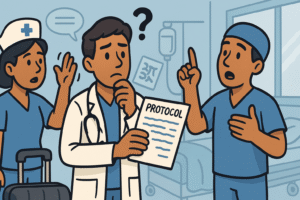
⚙️ Mistake 2: Not Learning the New System Fast Enough
Every country’s healthcare system has its quirks — electronic records, referral routes, drug formularies, insurance systems.
I assumed I could “pick things up” as I went. Instead, I spent my first month feeling lost in paperwork and delayed patient discharges.
Lesson: Medical systems are complex machines. Learn how yours runs early.
Tip: During orientation, shadow senior local staff and ask:
-
How does admission/discharge workflow differ?
-
Who approves tests or imaging?
-
What documentation is mandatory?
🔗 See also: How to Adapt to New Hospital Systems Quickly
🤝 Mistake 3: Trying to Handle Everything Alone
When you move overseas, isolation can sneak up fast. I tried to be “independent,” avoiding help because I didn’t want to seem incompetent. That isolation eventually became burnout.
Lesson: Even as a doctor abroad, you’re not alone.
Tip: Join local and expat doctor groups. Find mentors early — they’ll save you months of trial and error.
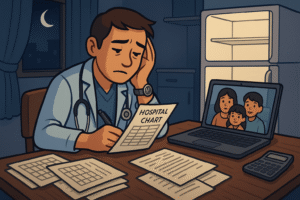
🕰️ Mistake 4: Ignoring Work-Life Balance
Working abroad can push you to overwork, especially when you feel pressure to prove yourself. My night shifts stretched longer than they should have, and I neglected exercise, sleep, and connection.
Lesson: You can’t pour from an empty cup.
Tip: Prioritize rest, routine exercise, and connection with loved ones. A short video call home can reset your mood more than you think.
💡 Related post: How I Manage Stress as a Doctor Working Overseas
💰 Mistake 5: Poor Financial Planning
As a foreign doctor, it’s easy to underestimate how expensive settling abroad can be — license fees, housing deposits, insurance, visa renewals, and sometimes months before your first paycheck.
I learned this the hard way when I ran low on funds halfway through my first month abroad.
Lesson: Financial preparation is part of professional preparation.
Tip:
-
Budget for 2 months’ expenses before your move.
-
Research taxes and currency differences.
-
Track every expense for the first 3 months.
BMA Guide — Working abroad as a doctor: key considerations
🗣️ Mistake 6: Underestimating the Language Barrier
Even if you speak English fluently, dialects and local slang can create miscommunication.
I once misunderstood a nurse’s shorthand for medication timing, nearly causing an error. That moment made me realize: language is a clinical tool — not just a formality.
Lesson: Don’t be embarrassed to clarify or ask for repetition.
Tip: Keep a short “translation notebook” for medical terms and daily phrases. It’ll become your safety net.
🧾 Mistake 7: Not Reading the Contract Carefully
When you’re eager to start, it’s tempting to sign without question. I did — and later learned my overtime policy wasn’t what I thought.
Lesson: Every clause in your contract matters.
Tip: Ask HR to clarify work hours, housing allowances, leave policy, and overtime pay in writing. If possible, have a senior expat doctor review it.
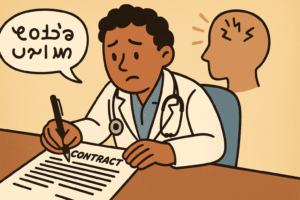
🧠 Mistake 8: Neglecting Mental Health
Loneliness, cultural shock, and work stress often overlap. For months, I convinced myself I was “just tired,” when in fact, I was mentally exhausted.
Lesson: Emotional well-being is as vital as clinical performance.
Tip:
-
Journal regularly.
-
Seek professional help if needed.
-
Stay active and build a small daily routine that grounds you.
🪶 Read next: Simple Evening Routines for Doctors to Recharge & Relax
🎯 Mistake 9: Losing Focus on Purpose
In the routine of rounds, paperwork, and calls, I forgot why I moved abroad in the first place — to grow, learn, and explore medicine beyond borders.
Lesson: Your “why” keeps you motivated during tough shifts.
Tip: Write your purpose somewhere visible — on your desk, your journal, or even your phone wallpaper.
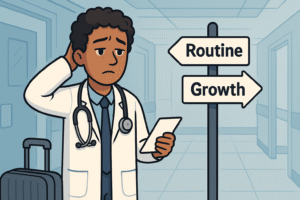
🌱 Mistake 10: Not Recognizing Growth Early Enough
When you’re a doctor abroad, growth doesn’t always look like promotions. It’s in how you adapt, communicate, and empathize across cultures.
Looking back, the things that once made me anxious — cultural barriers, new systems, homesickness — became my strengths.
Lesson: Every challenge is shaping you into a stronger, more adaptable doctor.
Tip: Reflect monthly. Write down one thing you’ve learned that makes you a better clinician.
💬 What I’d Do Differently Now
If I could start again, I’d:
-
Study local medical culture before my first day.
-
Set up an emergency fund before moving.
-
Prioritize mentorship instead of independence.
-
Keep journaling daily to process emotions.
-
Celebrate small wins, not just survival.
Working as a doctor abroad is not about being perfect — it’s about being prepared, adaptable, and human.

❓FAQ — Common Questions from Doctors Abroad
Q: How can I prepare for my first job as a doctor abroad?
Start at least three months early. Learn about visa, registration, and living costs. Build your support network before you arrive.
Q: What’s the biggest cultural challenge for doctors abroad?
Adapting communication — learning how to give feedback, receive criticism, and understand patients’ values in a new cultural context.
Q: How can I avoid burnout while working overseas?
Stay connected to your roots, build new friendships, and protect time for self-care. Use the same discipline you apply to patient care on your own health.
Q: Should I take any specific training before moving abroad?
Yes — cultural orientation, language basics, and a brief course in stress management can make all the difference.
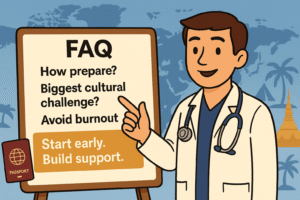
Conclusion — Becoming the Best Version of Yourself Abroad
Every doctor abroad starts as a beginner again — not just in medicine, but in culture, communication, and adaptability.
These 10 mistakes taught me humility, empathy, and resilience.
If you’re about to take your first step as a doctor abroad, remember: preparation beats perfection. Learn early, stay curious, and never lose your reason for becoming a healer — no matter where you are in the world.
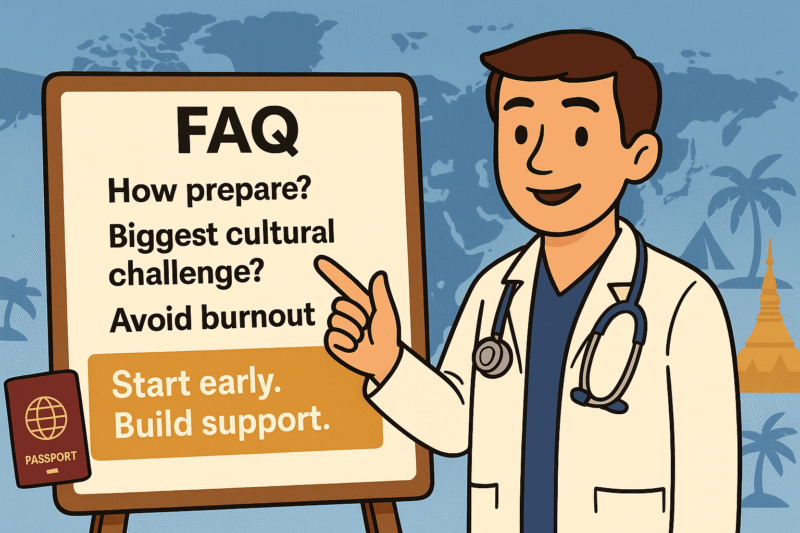



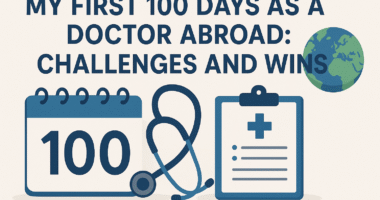
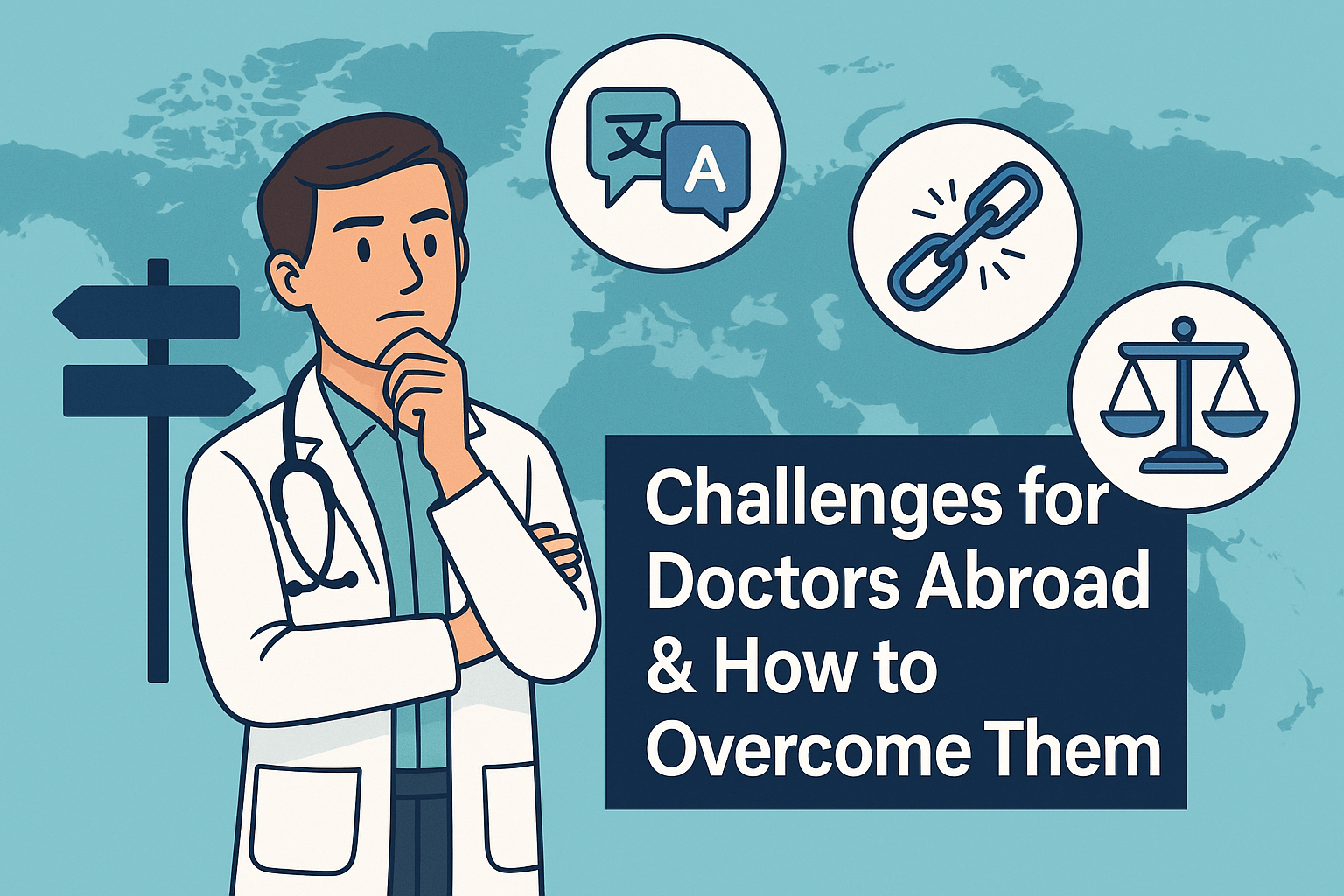




2 comments